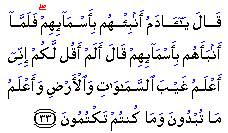Virtuous Humans, Truthfulness, Self-Criticism
Issue 562 » January 1, 2010 - Muharram 15, 1431
Living The Quran
Virtuous Humans
Al-Baqarah (The Cow) Sura 2: Verse 33
 "God said: 'O Adam, inform them of these things and beings with their names.' When he (Adam) informed them with their names, He said (to the angels), 'Did I not tell you that I know the unseen of the heavens and the earth, and I know all that you reveal and all that you have been concealing?'"
"God said: 'O Adam, inform them of these things and beings with their names.' When he (Adam) informed them with their names, He said (to the angels), 'Did I not tell you that I know the unseen of the heavens and the earth, and I know all that you reveal and all that you have been concealing?'"
Historically, humans have not avoided bloodshed nor ceased to cause disorder, from the beginning of their earthly existence. Furthermore, the majority of people have been those who follow false doctrines or beliefs and associate partners with God. However, this does not mean that the creation of humankind and our being appointed as vicegerents on the earth has proved evil and ugly. The following simple analogy will explain:
For example: 100 seeds of fruit have the value of 100 seeds while they are seeds. But once they are planted, if even 80 out of the 100 rot away while the remaining 20 germinate and grow to bear fruit, the value of those 20 will far exceed that of the 100 seeds.
If the human race had remained existent only in God's knowledge, without developing its potential on the earth, the Tree of Creation would not have yielded more than 100,000 Prophets, millions of saints, pure, exacting scholars, heroes of good morals, and other virtuous members of humankind. The good that these illustrious fruits have added to existence far exceeds the evil of the rest. The angels, at first, could not discern this outcome, but when the potential of the human race was made clear to them, they admitted its supremacy with full contentment of heart.
Compiled From:
"The Quran: Annotated Interpretation in Modern English" - Ali Unal, p. 28
Understanding The Prophet's Life
Truthfulness
Authentic books of Tradition as Sahih al-Bukhari, Sahih al-Muslim, and Sunan Abu Dawud relate from Abdullah Ibn Masud that God's Messenger said: "Always tell the truth, for this guides to absolute piety and piety leads to Paradise. Those who always tell and pursue the truth are recorded by God as truthful. Don't lie, for this guides to sinfulness and sinfulness leads to Hellfire. Those who always tell and pursue lies are recorded by God as liars."
Truthfulness opens the door of happiness in both worlds. No one can taste true bliss while living in the darkness of lies and lying. Lying is "an assertion contrary to God's knowledge," a pillar of unbelief, and the most manifest sign of hypocrisy. The current prevalence of lying is destroying our security and morality, and contaminating the whole community (especially its political circles) like a contagious disease. Any structure based on lying must eventually perish due to its very nature.
This hadith states that truthfulness leads to absolute piety, while lying leads to sinfulness. Birr, the Arabic word translated there as piety, encompasses every virtue, from sound thinking, truthfulness, and pure intention to honesty, decency, and good conduct. Its opposite, fujur (sinfulness), denotes every kind of deviation and evil, among them debauchery, indecency, and perversion.
Compiled From:
"The Messenger of God: Muhammad" - Fethullah Gulen, pp. 100-101
Blindspot!
Self-Criticism
It is necessary for an individual to pause at the end of each day that has passed, in order to check himself and run through his achievements: What has he done in the course of the day? Why has he done it? What has he omitted? Why has he omitted it?
How excellent it would be if this self-criticism were to take place before one retired to bed.
This period of self-criticism and appraisal should certainly be counted among man's moments of progress; it is a moment when man impartially sits as a judge over himself and reviews his yearnings and inclinations, his instincts and motivations. It is a moment when the believer appoints, out of his conviction, a policeman to watch over himself, an investigator to probe him, and a judge to condemn or acquit him. In this way he progresses from the state of "the soul that incites to evil" to the state of "the self-reproaching soul" which reproaches its owner whenever he plunges into sin, or falls short of expectation.
If a believer fails to observe this brief period of soul-searching daily, then he should at least try to do so once every few days, or once a week. In this way, he draws up his life balance sheet, depicting to him his (spiritual) assets and liabilities.
A believer should also have a longer period of this practice at the end of each month, and an even longer period at the end of the year, when he bids farewell to one year and prepares for and welcomes another. This is the time to critically review the past and plan for the future. This is the (spiritual) equivalent of his final accounts for the year.
Compiled From:
"Time in the Life of a Muslim" - Yusuf Al-Qaradawi, pp. 71-73